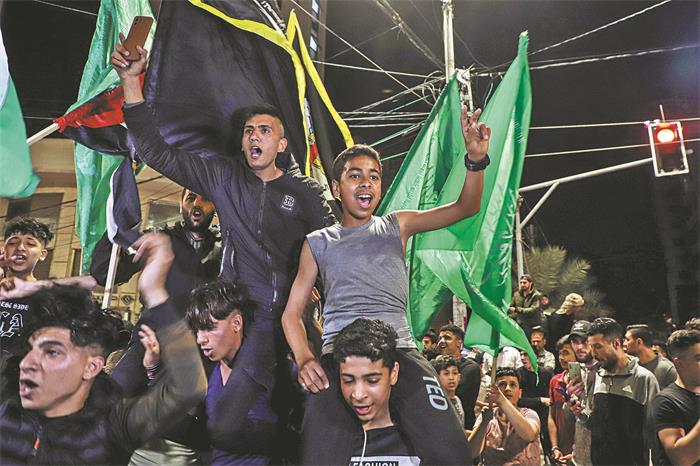Lasting peace urged amid Israel-Palestine cease-fire
An Egypt-brokered cease-fire between Israel and the Palestinian Islamic Jihad in the Gaza Strip has raised hopes of easing the humanitarian disaster of Palestinians, but finding a lasting peace should be the focus for the region, analysts said.

Palestinians in Gaza City celebrate on Saturday the announcement of an Egypt-brokered cease-fire agreement between Israel and the Palestinian Islamic Jihad group.
After five days of tit-for-tat fighting that killed 33 Palestinians and one Israeli, and injured almost 150 people, Israel and the PIJ agreed to end the bloody confrontation on Saturday.
However, a few minutes after the cease-fire took effect, militants fired around 20 rockets from the Gaza Strip at southern Israel, Xinhua News Agency reported. Israeli fighter jets fired back and targeted lookout posts and sites of the Gaza militants. No injuries were reported.
Palestinian sources close to the PIJ told Xinhua that calm returned to the Gaza Strip after a short exchange of fire between the militants and the Israeli army.
Dozens of Palestinians in Gaza took to the streets and squares. Loudspeakers sounded in some mosques to celebrate the ceasefire agreement, while a procession was organized for medical, ambulance, civil defense and police teams.
The PIJ was founded in 1981 by Palestinian students in Egypt with the aim of establishing a Palestinian state in the West Bank, Gaza and other areas illegally occupied by Israel, said a report by Al-Jazeera television.
Muhammad al-Hindi, a senior PIJ leader, told Cairo News Television that the agreement was reached "as a result of a continuation of the Egyptian effort".
Al-Hindi, who was part of the negotiations, said that "the ceasefire agreement includes stopping targeting civilians, homes and individuals." He added, "We will abide by the cease-fire agreement as long as the Israeli enemy adheres to it."
In a statement, the Israeli Prime Minister's Office expressed appreciation for Egypt's efforts to mediate the cease-fire. National Security Council Director Tzachi Hanegbi said that Israel's acceptance of the Egyptian initiative means that "quiet will be met with quiet".
Over five days, Israeli fighter jets and unmanned drones attacked Palestinian operatives that were launching rockets at Israel. Israel targeted buildings, military sites, posts and facilities that belong to the PIJ armed wing, Al-Quds Brigades.
On Wednesday and Thursday, the militants fired hundreds of rockets at central and southern Israel, killing one Israeli and injuring more than nine, according to Israeli media outlets.
"Although the Palestinians in Gaza have lost many casualties over the last five days, their resistance was united and disciplined," said Muslim Imran, director at the Asia Middle East Center for Research and Dialogue. "The joint command of Palestinian resistance factions has once again passed the test and denied Israel any political gains," Imran said.
"In the long run, this Israeli failure and Palestinian unity will encourage the solidification of Palestinian resistance in Gaza and the rest of Palestine," he added.
'Temporary relief'
The cease-fire "will bring temporary relief until the next round of conflict, which is inevitable given the brutal nature of occupation of Gaza and the West Bank," said Jawaid Iqbal, chairman of the Department of West Asian Studies and North African Studies at Aligarh Muslim University in Uttar Pradesh, India.
It may shore up Israeli Prime Minister Benjamin Netanyahu's support in the short term, but Netanyahu "also realizes the diminishing marginal utility of such futile confrontations", Iqbal said. "The contradictions inherent in settler colonialism have to be resolved for lasting peace."
Kamaruzaman Bin Yusoff, a Middle East analyst and former dean of Universiti TeknologiMalaysia's Faculty of Islamic Civilization, underscored the need to hold those responsible for the tensions accountable.
"Why is it that the world leaders, either in America or in the (other Western countries), don't bother about this war (but) they are so busy about Russia and Ukraine?"
"There must be a permanent solution" to the conflict, he said, adding that leaders should no longer "look and wait" to see if "there is a war next week".
